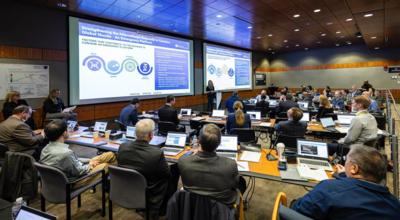Tue, Jun 25, 2024
5th Exercise Assesses Readiness Against Orbital Threats
NASA got the "planetary defense community" together for a good ol' game of '5th Planetary Defense Interagency Tabletop Exercise', playing out their responses to a prospective celestial impact.

IN reality the word "tabletop" belies a level of fun NASA folks probably did not have, but the exercise did let everyone game out exactly how their agencies would work together in case of asteroid impact. The exercise takes place on a biennial basis, bringing together the Planetary Defense Coordination Office, FEMA (Federal Emergency Management Agency) and the U.S. Department of State Office of Space Affairs as they assess how well the country would fare under threat of a potentially hazardous asteroid or comet. The administration stressed that there are currently "no known significant asteroid impact threats for the foreseeable future" but it never hurts to dust off the books and game it out. They didn't just try to plan for apocalyptic impacts, either, but smaller bodies that would cause minor regional damage with less forewarning.
The exercise considered the response to a novel asteroid given 72% chance of striking true in 14 years, with gamers having to deal with problems like assessments, studies, and trajectory planning as the hypothetical body passed behind the Sun. The exercise made use of fresh data from the recent DART mission, a test that bore out whether the world could snipe incoming space debris with suitably kinetic operations.

“The uncertainties in these initial conditions for the exercise allowed participants to consider a particularly challenging set of circumstances,” said Lindley Johnson, planetary defense officer emeritus NASA Headquarters in Washington. “A large asteroid impact is potentially the only natural disaster humanity has the technology to predict years in advance and take action to prevent.”
“Our mission is helping people before, during, and after disasters,” added Leviticus “L.A.” Lewis, FEMA detailee to NASA’s Planetary Defense Coordination Office. “We work across the country every day before disasters happen to help people and communities understand and prepare for possible risks. In the event of a potential asteroid impact, FEMA would be a leading player in interagency coordination.”
“These outcomes will help to shape future exercises and studies to ensure NASA and other government agencies continue improving planetary defense preparedness,” said Johnson.
More News
From 2023 (YouTube Edition): "Ain’t Your Daddy’s Super Cub”—Don Wade Co-owned by Don and Ron Wade—the former of Don’s Dream Machines, a storied >[...]
Pilot-Rated Passenger Reported That The Pilot Did Not Adequately “Round Out” The Landing Flare And The Airplane Bounced And Yawed To The Right Analysis: The pilot state>[...]
Dead Reckoning Dead reckoning, as applied to flying, is the navigation of an airplane solely by means of computations based on airspeed, course, heading, wind direction, and speed,>[...]
Aero Linx: Lake Amphibian Club This website is created and sponsored by the Lake Amphibian Club, to help spread the word about these wonderful, versatile amphibians that can land j>[...]
“I am deeply honored to be sworn in as NASA administrator. NASA’s mission is as imperative and urgent as ever — to push the boundaries of human exploration, ignit>[...]
 Classic Aero-TV: In Praise of Alabamas Patriot Aircraft USA
Classic Aero-TV: In Praise of Alabamas Patriot Aircraft USA NTSB Final Report: Cirrus Design Corp SR22
NTSB Final Report: Cirrus Design Corp SR22 ANN's Daily Aero-Term (12.21.25): Dead Reckoning
ANN's Daily Aero-Term (12.21.25): Dead Reckoning ANN's Daily Aero-Linx (12.21.25)
ANN's Daily Aero-Linx (12.21.25) Aero-News: Quote of the Day (12.21.25)
Aero-News: Quote of the Day (12.21.25)




